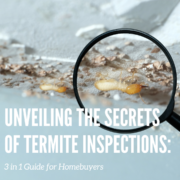UNVEILING THE SECRETS OF TERMITE INSPECTIONS: 3 IN 1 GUIDE FOR HOMEBUYERS
The excitement of buying a new home often comes with the responsibility of ensuring it stands strong and resilient against unforeseen challenges. One such silent threat is the potential invasion of termites, which can wreak havoc on a property’s structural integrity. In this blog, we’ll delve into the world of termite inspections – understanding what they entail, the process involved, and how savvy homebuyers can determine if they need one.
1# What is a Termite Inspection?
A termite inspection is a specialized examination conducted by professionals to assess a property for the presence of termites or any termite-related damage. Termites are small, social insects that feed on cellulose-containing materials, such as wood. When termites infest a structure, they can cause significant damage to wooden components, potentially compromising the structural integrity of the building.
Having a termite inspection in Arizona, and in many other regions, is of utmost importance due to several factors unique to the climate and geography of the area. Here are key reasons why termite inspections are particularly crucial in Arizona:
- High Termite Activity: Arizona is home to several termite species, including subterranean termites, which are known for their destructive capabilities. The warm climate and favorable conditions provide an ideal environment for termites to thrive. Regular inspections are essential to catch infestations early and prevent extensive damage.
- Wood-destroying organisms: Termites are classified as wood-destroying organisms (WDOs). These pests feed on cellulose, a component found in wood and other materials used in construction. Given that many homes in Arizona have wooden components, the risk of termite infestations and subsequent damage is heightened.
- Potential Structural Damage: If left unchecked, termite infestations can lead to severe structural damage. Termites silently work within the walls and foundation of a structure, compromising its integrity. Regular inspections help identify termite activity before it escalates, preventing extensive and costly repairs.
- Preventive Measures are Key: Arizona homeowners benefit significantly from adopting a proactive approach to termite control. Termite inspections serve as a preventive measure, allowing homeowners to address vulnerabilities and implement protective measures before an infestation occurs.
- Home Resale Considerations: During real estate transactions, termite inspections are often required. Potential buyers are keen on ensuring that the property they are investing in is free from termite damage. Sellers can proactively address any issues identified during an inspection, enhancing the property’s marketability.
Having a termite inspection in Arizona is not just a recommended practice; it’s a vital component of responsible homeownership. It helps safeguard homes from the pervasive threat of termites, ensures structural integrity, and contributes to the overall longevity of the property.
2# The Process Unveiled:
Embarking on the journey of homeownership involves more than just finding the perfect property; it requires safeguarding your investment against potential threats. Termite inspections play a pivotal role in this protective process, ensuring that the unseen forces of these silent invaders are uncovered and addressed. Let’s take a closer look at the comprehensive process of termite inspections:
- Scheduling the Inspection: The voyage begins with the decision to schedule a termite inspection—a prudent move often recommended before the finalization of a property purchase. This critical step can be undertaken as a standalone service or seamlessly integrated into a comprehensive home inspection. The aim is to proactively assess the property’s vulnerability to termite activity.
- On-site Examination: With the appointment set, trained and licensed inspectors step onto the scene, ready to conduct a meticulous examination. Their expertise extends to both the interior and exterior, with a keen focus on areas notorious for termite activity. Basements, crawlspaces, attics, and the foundation become the canvas for their scrutiny, as they strive to unveil any signs of termite presence.
- Identification of Termite Species: Termites come in various species, each with distinct characteristics and behaviors. The inspector takes on the role of a termite detective, identifying the specific species present. This critical piece of information is the compass guiding the determination of an appropriate treatment plan tailored to the nuances of the invaders.
- Assessment of Damage: If the silent culprits—termites—are detected during the inspection, the next phase involves a thorough assessment of the extent of their damage. This evaluation is the compass guiding the determination of necessary steps for remediation and repair. Understanding the scope of the issue is paramount in crafting an effective strategy to restore the property to its optimal condition.
- Recommendations and Reporting: As the inspection culminates, the inspector transforms their findings into a comprehensive report—a roadmap of insights. This document goes beyond mere documentation; it includes invaluable recommendations for treatment, preventative measures, and any essential repairs. Armed with this information, homeowners can make informed decisions, fortifying their property against future termite threats.
In essence, the process of termite inspections is an orchestrated dance between expertise and diligence. It’s a proactive stance against the unseen forces that, if left unchecked, can compromise the very foundation of your homeownership dreams. As you navigate the exciting path to property ownership, let termite inspections be your shield against the silent invaders, ensuring that your haven remains resilient and termite-free.
3# Do Homebuyers Need a Termite Inspection and is it required by lenders?
Due to the high likelihood of termite infestation in homes, we always recommend having a home inspected for termites. The necessity of a termite inspection for lenders can vary based on factors such as the loan type, local regulations, and the lender’s guidelines. Here are some important aspects to consider regarding termite inspections and their possible requirement by lenders.
- Purpose of Termite Inspections: The primary purpose of a termite inspection is to assess the property for the presence of termites and any damage caused by them. Termites are often referred to as “silent destroyers” because they can go unnoticed while causing substantial damage.
- Types of Loans and Inspections: Certain types of loans, such as those insured by the Federal Housing Administration (FHA) or guaranteed by the Department of Veterans Affairs (VA), may have specific requirements regarding termite inspections. These loans often involve standards for pest inspections as part of the overall property evaluation.
- Local Regulations: Local regulations and practices can influence whether termite inspections are required. In areas with a known risk of termite infestations, local authorities may have regulations that necessitate inspections.
- Purchase Agreement and Lender Requirements: The terms of the purchase agreement between the buyer and seller can also impact whether a termite inspection is required. Additionally, individual lenders may have their own policies and requirements regarding termite inspections. Some lenders may insist on an inspection as a condition of the loan.
- Property Conditions and History: The condition of the property and any visible signs of termite damage or infestation may prompt a lender to request a termite inspection. If a property has a history of termite issues, or if neighboring properties have had termite problems, a termite inspection becomes highly advisable.
- Peace of Mind: Even if not required, many homebuyers opt for termite inspections for peace of mind. Knowing the condition of a property, including any potential termite issues, allows buyers to make informed decisions.
Homebuyers are typically informed about any requirements for inspections, including termite inspections, during the loan application process. If a lender requires a termite inspection, it is often specified in the loan conditions. Homebuyers should communicate with their lenders, review loan documents carefully, and, if necessary, seek guidance from real estate professionals to understand and fulfill any inspection requirements related to termites.

